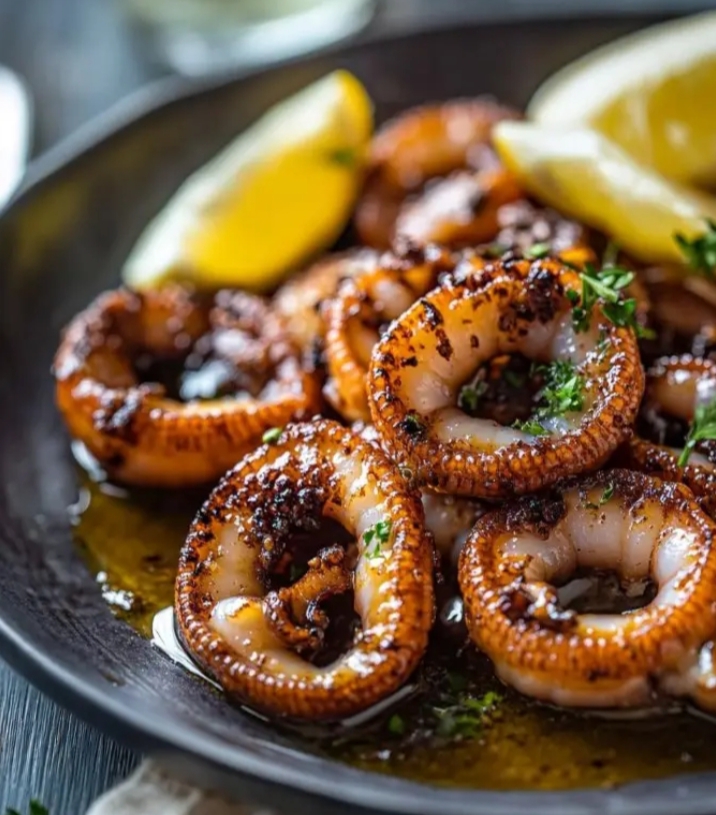Why Marinated Baby Octopus Is a Must-Try Dish
Picture this: a warm summer evening, friends gathered around the table, and a plate of tender, flavorful Marinated Baby Octopus sitting front and center. This dish has been a favorite in my household for years, and it’s not just because it’s delicious—though trust me, it is. It’s also incredibly easy to make. Last summer, I decided to try this recipe for the first time during a backyard dinner party. The result? A standing ovation from my guests. If you’re looking for a dish that combines elegance with simplicity, this is it.
The Story Behind Marinated Baby Octopus
Marinated Baby Octopus has deep roots in Mediterranean cuisine. From Spain to Greece, this dish is celebrated as part of coastal traditions. In Portugal, for instance, baby octopus is often grilled and served with olive oil and lemon. Italians love pairing it with pasta, while Greeks enjoy it cold as part of a mezze platter. I find it fascinating how one ingredient can be transformed into so many different dishes depending on the region. My version brings together these influences, creating a marinated delight that’s perfect for modern gatherings or quiet dinners at home.
Why You’ll Love This Recipe
This recipe is all about balance. The tenderness of the baby octopus meets the zesty tang of balsamic vinegar and the earthy aroma of fresh herbs. Plus, it’s simple enough for beginners but impressive enough for seasoned cooks. One bite, and you’ll understand why this dish is a crowd-pleaser. Whether you’re hosting a fancy soirée or just craving something new, this recipe will leave your taste buds dancing.
When to Serve Marinated Baby Octopus
This dish shines as an appetizer or snack. Think tapas night, beachside barbecues, or even holiday parties. I once served it at a New Year’s Eve gathering, and everyone kept coming back for seconds (and thirds!). Its versatility makes it ideal for any occasion where good food and great company are involved.
Ingredients You’ll Need
- 550 g (about 19 oz) cleaned baby octopus
- 5 sprigs of fresh rosemary
- 5 whole cloves
- 5 whole black peppercorns
- 3 bay leaves
- 2 tablespoons extra virgin olive oil
- 1 teaspoon salt, or more to taste
- Ground black pepper, to taste
- 2 teaspoons dried oregano
- 1 tablespoon balsamic vinegar, or more to taste
Substitutions and Alternatives
If you can’t find baby octopus, regular octopus works too—just cut it into smaller pieces. Swap rosemary for thyme if needed, and feel free to use red wine vinegar instead of balsamic for a slightly sharper flavor. For those watching their sodium intake, reduce the salt and add a splash of lemon juice for brightness.
Step 1: Cooking the Baby Octopus
Start by placing the rosemary, cloves, peppercorns, and bay leaves in a medium pot. Add the cleaned baby octopus and cover with water. Bring it to a gentle simmer, then lower the heat and let it cook for about 75 minutes. During this time, your kitchen will fill with the most incredible herbal aroma. Pro tip: Don’t rush the cooking process; slow-cooking ensures the octopus becomes perfectly tender.
Step 2: Preparing the Marinade
Once the octopus is cooked, drain it and let it cool slightly. Cut each piece into bite-sized chunks and transfer them to a serving dish. Now comes the fun part—mixing the marinade! Combine the olive oil, salt, pepper, oregano, and balsamic vinegar. Toss everything together until the octopus is evenly coated. The colors here are stunning: deep purple hues from the vinegar mingling with the glossy sheen of olive oil.
Step 3: Serving Your Creation
Serve immediately for a warm, comforting experience, or chill it in the fridge for a refreshing twist. Either way, your guests will rave about the bold flavors. Chef’s tip: Let the marinated octopus sit for at least 30 minutes before serving to allow the flavors to meld.
Timing Breakdown
- Preparation Time: 5 minutes
- Cooking Time: 1 hour 15 minutes
- Total Time: 1 hour 20 minutes
Chef’s Secret
For an extra layer of flavor, toast the peppercorns and cloves lightly before adding them to the pot. This small step adds a subtle smokiness that elevates the dish.
An Interesting Fact About Baby Octopus
Baby octopuses are not actually babies—they’re a specific species known for their petite size. Despite their small stature, they pack a punch when it comes to flavor and texture. Fun fact: octopuses have three hearts, two of which stop beating when they swim!
Necessary Equipment
- Medium-sized pot with lid
- Colander for draining
- Sharp knife for cutting
- Mixing bowl
Storage Tips
To store leftovers, place the marinated octopus in an airtight container and refrigerate for up to three days. Make sure the marinade fully covers the octopus to preserve its flavor. When reheating, do so gently over low heat to prevent the delicate texture from becoming rubbery.
Freezing isn’t recommended for this dish, as freezing can alter the texture of the octopus. However, if you must freeze it, consume within a month for best results.
If you plan to take it on a picnic, keep it chilled in a cooler until ready to serve. This ensures food safety while maintaining optimal taste.
Tips and Advice
- Use high-quality olive oil—it truly makes a difference.
- Taste as you go. Adjust seasoning based on personal preference.
- Let the octopus rest in the marinade for at least 30 minutes before serving.
Presentation Ideas
- Serve on a bed of arugula for added color and freshness.
- Garnish with lemon wedges and fresh parsley.
- Arrange in a circular pattern on a large platter for visual appeal.
Healthier Alternatives
- Olive Oil Reduction: Use half the amount of olive oil and replace the rest with vegetable broth.
- No Salt Version: Omit salt entirely and rely on herbs and spices for flavor.
- Vegan Option: Replace octopus with roasted mushrooms for a plant-based alternative.
- Low-Carb Twist: Skip the balsamic vinegar and use apple cider vinegar instead.
- Spicy Kick: Add red pepper flakes to the marinade for heat lovers.
- Herb Swap: Experiment with basil or cilantro instead of oregano.
Common Mistakes to Avoid
Mistake 1: Overcooking the Octopus
Overcooking turns octopus rubbery rather than tender. To avoid this, stick to the recommended cooking time and test for doneness by piercing with a fork. Pro tip: Simmer gently and resist the urge to crank up the heat.
Mistake 2: Skipping the Resting Time
Not letting the octopus rest in the marinade leads to uneven flavor distribution. Patience pays off here—allow at least 30 minutes for the magic to happen.
Mistake 3: Using Low-Quality Ingredients
Cheap olive oil or stale spices can ruin the dish. Invest in quality ingredients, especially since this recipe relies heavily on their flavors.
Frequently Asked Questions
Can I use frozen baby octopus?
Absolutely! Just thaw it completely before cooking. Frozen octopus may require slightly longer simmering to achieve tenderness.
How long does marinated baby octopus last?
Stored properly in the fridge, it lasts up to three days. Always check for off smells or discoloration before consuming.
Is baby octopus sustainable?
Yes, baby octopus is generally considered sustainable due to its rapid reproduction rates. Look for responsibly sourced options labeled as such.
Can I grill the octopus after marinating?
Definitely! Grilling adds a smoky char that complements the marinade beautifully. Just brush with additional oil to prevent sticking.
What sides pair well with this dish?
Crusty bread, roasted potatoes, or a crisp salad make excellent accompaniments.
Do I need to clean the octopus myself?
If buying fresh, yes. Most stores sell pre-cleaned octopus, but double-check to ensure no ink sacs remain.
Can I omit the balsamic vinegar?
Yes, substitute with lemon juice or another acid like white wine vinegar.
Is this dish spicy?
Not inherently, but you can add chili flakes or hot sauce to spice it up.
Can I make this ahead of time?
Yes! In fact, preparing it a day in advance enhances the flavors.
What’s the nutritional value?
Each serving contains approximately 396 calories, with 13g fat, 13g carbs, and 54g protein—a nutrient-dense option!
Final Thoughts
There’s something magical about Marinated Baby Octopus. Whether you’re a seasoned chef or a curious beginner, this recipe promises delicious results every time. So grab your apron, gather your ingredients, and get ready to wow your loved ones with this Mediterranean masterpiece. Bon appétit!

Marinated Baby Octopus
Ingredients
Equipment
Method
- Place the rosemary, cloves, peppercorns, and bay leaves in a medium pot. Add the cleaned baby octopus and cover with water.
- Bring the pot to a gentle simmer, then lower the heat and let it cook for about 75 minutes.
- Once cooked, drain the octopus and let it cool slightly. Cut each piece into bite-sized chunks and transfer to a serving dish.
- In a mixing bowl, combine olive oil, salt, pepper, oregano, and balsamic vinegar. Toss until the octopus is evenly coated.
- Serve immediately or chill in the fridge. Ideally, let the marinated octopus sit for at least 30 minutes before serving.
